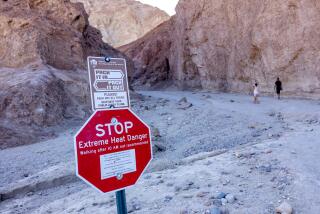PRACTICAL VIEW : Be Careful When the Heat Is On : Home safety: Portable space heaters can be a safe way to stay warm if a few precautions are taken.
- Share via
A fire sparked by a small electric heater gutted a Newbury Park trailer last January, causing about $36,000 in damage.
Several months earlier a space heater ignited vapors from gasoline used to clean auto parts in a Northridge garage. Two men were severely burned.
The accidents illustrate the dangers of portable electric heaters as use increases during winter.
Home heating equipment caused an estimated 85,200 fires nationally in 1991, the last year for which figures are available.
Among heating equipment fires, those caused by portable space heaters were the second leading cause of death (165) and the third leading cause of injuries (467), says the National Fire Protection Assn., a nonprofit fire safety advocacy group based in Quincy, Mass. (Water heaters were the leading cause of injuries.)
During the same year in Los Angeles, portable heaters caused 28 fires, six injuries and $300,000 in damage, according to the California State Fire Marshal.
“The problem is usually related to the heater being too close to something combustible, such as a bedspread or upholstery, or that the heater gets accidentally tipped over,” says Ed Seits, deputy chief of the Fire Marshal’s office in Sacramento.
“Most of the fires are not major. Yet in Los Angeles County they caused about $11,000 damage each, and that’s expensive for most people,” he says.
Accidents can be avoided by following precautions offered by the Fire Protection Assn., the City and County Fire Departments and Southern California Edison:
* Keep heaters at least three feet from combustible material such as drapes, bedspreads or furniture, and don’t use heaters to dry towels or clothing.
* Do not place heaters in doorways, walkways or other places where they can be knocked over.
* Don’t place heaters where children play.
* Don’t leave heaters turned on and unattended.
* Keep heaters away from water.
* Replace frayed cords immediately. Avoid extension cords except those labeled heavy duty. Most extensions can’t carry enough power to operate heaters and may short-circuit or burn.
Consumers can also take precautions when buying the appliances.
* Look for a seal of approval from UL (Underwriters Laboratories), FM (Factory Mutual) or other reliable testing laboratory. The seals ensure that the heater complies with manufacturers’ claims and is safe if used in the recommended way.
* Before you buy, take the heater out of the box, put it down and make sure it doesn’t tip easily.
* Look for an automatic shut-off device that is activated if the heater tips over. The shut-off should operate if the heater falls in any direction.
* Look for a sensor that automatically shuts the appliance off if it overheats.
Consumers should also be aware of the dangers of other types of heaters and never use kerosene or charcoal for heat inside buildings.
Portable unvented heaters that burn kerosene are illegal in California homes, although they may be used in garages or open spaces.
Capt. Steve Ruda of the Los Angeles City Fire Department says, “We’ve seen several instances where people try to keep warm by lighting charcoal in hibachis or barbecues. In an enclosed space, they often die of carbon monoxide poisoning.”
The National Fire Protection Assn. also has recommendations for fireplaces and wood-burning stoves.
It recommends that fireplaces be professionally inspected prior to every heating season and cleaned if necessary.
Screens should always be used for protection and only wood should be burned. Paper and pine boughs can float out the chimney and ignite a roof or neighboring home.
Wood stoves should carry the label of a testing laboratory. Chimney connections and flues should be inspected at the start of each heating season and cleaned periodically.
Burn only wood and be sure the stove is placed on an approved board to protect the floor from heat and hot coals. Check with the local fire department and building code officials about regulations and safety measures before installing a stove.
Even if precautions fail and a fire starts, injury or damage may be minimized if the home has working smoke detectors.
“The majority of homes in the U.S. have smoke detectors,” says Capt. Steve Valenzuela, a Los Angeles County Fire Department information officer, “but nearly half don’t work because batteries aren’t changed periodically or there are problems in the electric system.
“This is a time of year when we could purchase a smoke detector for family or friends. The bottom line is to check them regularly. Push the button to set off the alarm or buy an aerosol spray, which simulates smoke.”
Safety Tips for Portable Electric Heaters
To avoid even the potential of trouble with portable electric heaters, fire-prevention and safety experts emphasize safety precautions:
* Buy only products that have been certified safe by an independent testing organization. In the United States, the most widely recognized safety seal is “UL” of Underwriters Laboratories Inc.
* Read the manufacturers’ instructions and warnings before even plugging in heaters.
* Place heaters where they will not be bumped into or knocked over.
* Keep heaters at least 3 feet from anything combustible, including drapes, bedding and wallpaper. Never place clothes on heaters to dry. According to the National Fire Protection Assn., a nonprofit fire-safety advocacy group, the leading cause of electric-heater fires (36%) and electric-heater fire deaths (42%) is having combustible items too close to heaters.
* Plug heaters directly into wall receptacles. If an extension cord is absolutely necessary, use only heavy-duty cords rated to handle the electrical output of the heater. Don’t use heaters with frayed or cracked electrical cords: have them replaced.
* Do not use heaters near water.
* Follow manufacturers’ instructions for routine maintenance.
More to Read
Sign up for Essential California
The most important California stories and recommendations in your inbox every morning.
You may occasionally receive promotional content from the Los Angeles Times.













